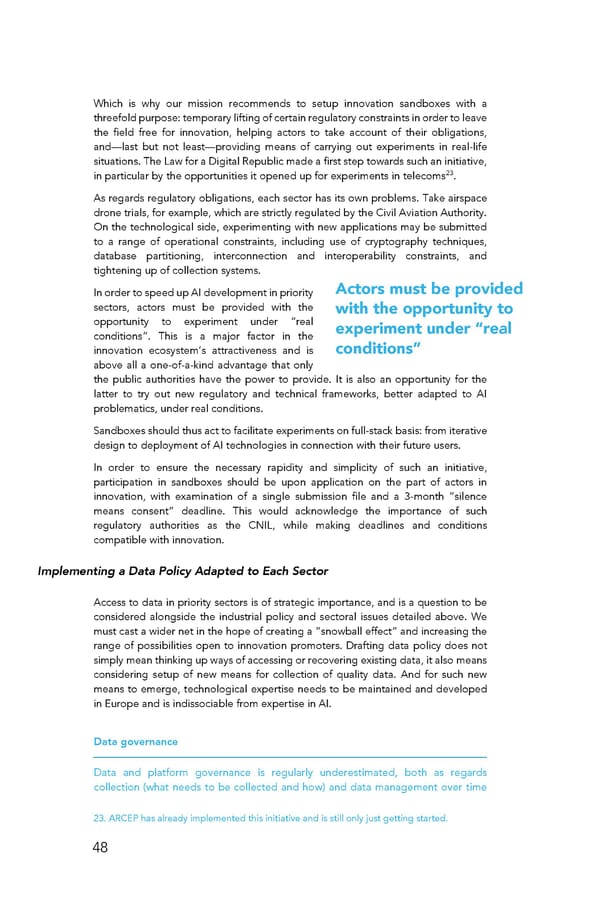Which is why our mission recommends to setup innovation sandboxes with a threefold purpose: temporary lifting of certain regulatory constraints in order to leave the field free for innovation, helping actors to take account of their obligations, and—last but not least—providing means of carrying out experiments in real-life situations. The Law for a Digital Republic made a first step towards such an initiative, in particular by the opportunities it opened up for experiments in telecoms23. As regards regulatory obligations, each sector has its own problems. Take airspace drone trials, for example, which are strictly regulated by the Civil Aviation Authority. On the technological side, experimenting with new applications may be submitted to a range of operational constraints, including use of cryptography techniques, database partitioning, interconnection and interoperability constraints, and tightening up of collection systems. In order to speed up AI development in priority Actors must be provided sectors, actors must be provided with the with the opportunity to opportunity to experiment under “real experiment under “real conditions”. This is a major factor in the conditions” innovation ecosystem’s attractiveness and is above all a one-of-a-kind advantage that only the public authorities have the power to provide. It is also an opportunity for the latter to try out new regulatory and technical frameworks, better adapted to AI problematics, under real conditions. Sandboxes should thus act to facilitate experiments on full-stack basis: from iterative design to deployment of AI technologies in connection with their future users. In order to ensure the necessary rapidity and simplicity of such an initiative, participation in sandboxes should be upon application on the part of actors in innovation, with examination of a single submission file and a 3-month “silence means consent” deadline. This would acknowledge the importance of such regulatory authorities as the CNIL, while making deadlines and conditions compatible with innovation. Implementing a Data Policy Adapted to Each Sector Access to data in priority sectors is of strategic importance, and is a question to be considered alongside the industrial policy and sectoral issues detailed above. We must cast a wider net in the hope of creating a “snowball effect” and increasing the range of possibilities open to innovation promoters. Drafting data policy does not simply mean thinking up ways of accessing or recovering existing data, it also means considering setup of new means for collection of quality data. And for such new means to emerge, technological expertise needs to be maintained and developed in Europe and is indissociable from expertise in AI. Data governance Data and platform governance is regularly underestimated, both as regards collection (what needs to be collected and how) and data management over time 23. ARCEP has already implemented this initiative and is still only just getting started. 48
 For a Meaningful AI - Report Page 48 Page 50
For a Meaningful AI - Report Page 48 Page 50